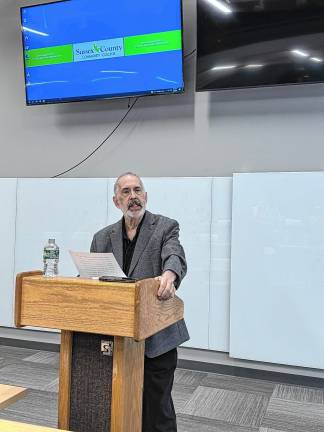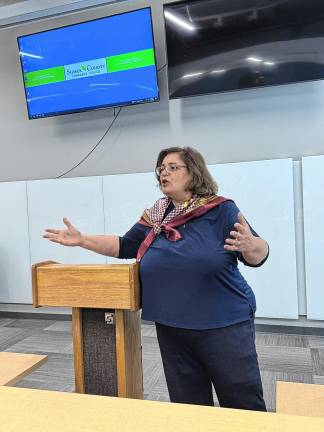Longtime journalist worried about profession
NEWTON. During talk at SCCC, author and television news producer David Page urges audience to actively seek out the news from multiple sources.


“At the top of the stretch, Journalism is on the move as they turn for home and Sovereignty is coming up with him on the outside ... Journalism and Sovereignty nose to nose ... Sovereignty has taken the lead, Journalism is second ... but it will be Sovereignty to rule the Kentucky Derby,” announcer Larry Collmus called at the 151st Run for the Roses on May 3.
As Sovereignty thundered past Journalism in the final stretch, the racetrack became a metaphor for the modern world, where state power races neck-and-neck with the free press.
Sovereignty did cross the line first in Louisville, a reminder that governments often set the pace while journalists must fight harder than ever not to be left in the dust.
Then Journalism won the Preakness, the second race of the Triple Crown on May 17, while Sovereignty was not even a contender.
The third race, the Belmont Stakes, will be Saturday, June 7.
Real battles involving journalism were the topic of a talk by author and television news producer David Page on May 2 at Sussex County Community College (SCCC) in Newton.
Nancy Gallo, director of the college’s Center for Lifelong Learning, introduced Page, asking, “Have you noticed the newspaper is a little light?
“Our own reporters at the New Jersey Herald are not there. We are a news desert.”
Page, who lives near the Jersey Shore, talked about his experience working at ABC and NBC, covering some stories, including the opening of the Berlin Wall and conflict in the Middle East.
“I’ve been a journalist for more than 50 years now, and frankly, the profession and the vital role journalism plays in American democracy are in deep trouble,” he said.
In radio at 15
Page’s first job was at a tiny radio station in rural Massachusetts when he was 15 years old. He started as a DJ, then moved to news, “motivated as so many of my peers were, by admiration for Woodward and Bernstein, whose reporting on Watergate we read in real time every day.”
“The Nixon administration did all it could to attack that reporting,” he said. Still, “despite constant criticism of the press by those who didn’t like its stories, there was a general belief that overall, we weren’t making things up. And that facts were facts.
“There was a widespread belief that what journalists did was important to the country. The founders certainly thought so. They enshrined freedom of the press in the First Amendment to the Constitution.”
Page noted that times have changed and so has the press with money fueling that change.
“It’s the news business now,” he said. “What had been seen as a civic responsibility is now seen as a cash cow. Realistically, you can’t put out a paper or air a newscast if you can’t pay for the ink or the cameras.”
He pegs the beginning of the change to 1985, while he was working as an NBC News producer, when RCA, which owned NBC, merged with GE, a huge conglomerate with no history in journalism.
“And we soon realized it wasn’t a merger; in reality, it was a buyout, a takeover. Similar changes of control were taking place at CBS and ABC around the same time. To our new owners, journalism was not a goal, it was a drag on the bottom line.
“They had purchased huge money-making entertainment machines that came with an inconvenient element: news departments full of people who believed what they were doing was vital to the country and had never doubted that their bosses would continue to fund them as a civic responsibility.”
Ads move to internet
Another major shift occurred with the arrival of the internet, which took advertisement dollars from local newspapers, Page said.
“And as more and more citizens turned to the internet sites as a news source and then social media, fewer and fewer people felt any need to subscribe to their local paper, which made those papers inviting targets for venture capitalists and big corporations who saw a chance to make money by buying them up in bulk and stripping them to the barest bones by cutting their journalistic resources.
“And those that could not be made profitable would be shut down creating what we now call news deserts ... places totally without any local news source at all.”
According to a 2024 study, 55 million Americans now live in areas with limited or no access to local news, Page said, pointing out that 127 newspapers closed in 2024, bringing the total that have closed since 2005 to more than 3,000.
“You can find national news on the internet or TV, but the absence of local journalism is particularly troubling because it’s at the level of the local school board or police department or zoning board that there is an opportunity for massive corruption if no one is asking questions,” he said.
“When local media go away, residents, who now know less about what’s going on around them, participate less in state and local politics.”
TV news today largely is controlled by a few powerful companies focused more on profit than public service, he explained. Those corporations are slashing staff, overworking reporters and underpaying them while prioritizing ratings over journalism.
Nationally, coverage has shifted from what the public needs to know to what it wants to watch: lighter, promotable stories that attract viewers, often at the cost of complex, critical reporting on topics such as economics or climate change.
Avoid biased bubble
Page urged news consumers to “actively seek out information, not passively wait for it to come to us.”
“If you rely on a social media feed to push your news to you, you are living in a biased bubble” because algorithms remember your likes and interests.
“To truly be informed, you’ve gotta get out of your silo and consider other opinions.”
He also criticized the use of artificial intelligence (AI) in journalism.
“An increasing number of outlets are using it to summarize or even write some stories, and so far, it is frequently proving to be wrong.”
He recommended that Americans check news outlets based in other countries, such as the BBC, the Economist, the Times of London and the Financial Times
“The view of our country from afar is often more clear-eyed with distance than what is written here.
“I believe journalism is an essential part of keeping America free,” he concluded. “I want everyone to understand just how precarious our grip on a free press has become.”